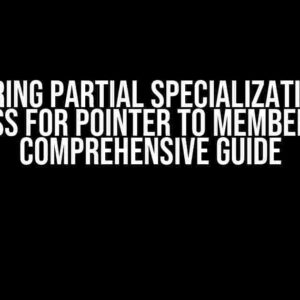As a C++ developer, you’ve likely encountered the age-old conundrum: when working with std::optional<std::string>, do you need to manually move out of it or can you rely on copy elision to handle it automatically? Fear not, dear reader, for today we’ll delve into the world of move semantics and explore the ins and outs of this pesky problem.
The Basics: What is an std::optional<std::string>?
Before we dive into the meat of the matter, let’s take a step back and revisit the basics. An std::optional<std::string> is a type of container that can hold a value of type std::string, but may also be empty (i.e., it’s “optional”). Think of it as a container that can hold a string, but also has a “null” or “empty” state.
std::optional<std::string> maybeString = "Hello, World!";
std::optional<std::string> emptyString;In the above example, maybeString holds a valid string, while emptyString is, well, empty.
Copy Elision: A Brief Introduction
Copy elision is a C++ compiler optimization that eliminates unnecessary copies of objects during the construction and assignment of temporary objects. In simple terms, it means the compiler can skip creating unnecessary copies of objects, making your code more efficient.
When a function returns an object by value, the compiler creates a temporary object, which is then copied into the destination object. Copy elision kicks in when the compiler can prove that the temporary object will be destroyed immediately after the function call, allowing it to skip the unnecessary copy and directly construct the object in the destination location.
std::string foo() {
std::string result = "Hello, World!";
return result;
}
std::string bar = foo();In the above example, the compiler can elide the copy of the temporary object returned by foo(), directly constructing the object in the bar variable.
The Conundrum: Should I Move or Not?
Now that we’ve covered the basics, let’s get back to our original question: when working with an std::optional<std::string>, should you move out of it or rely on copy elision?
The short answer is: it depends. But don’t worry, we’ll explore the scenarios in which you should move and when copy elision will handle it automatically.
Scenario 1: Returning an std::optional<std::string> by Value
When returning an std::optional<std::string> by value from a function, the compiler can perform copy elision, skipping the unnecessary copy of the temporary object.
std::optional<std::string> foo() {
std::string result = "Hello, World!";
return result; // Copy elision kicks in!
}
std::optional<std::string> bar = foo();In this scenario, the compiler can elide the copy, directly constructing the object in the bar variable. You don’t need to manually move out of the std::optional<std::string>.
Scenario 2: Returning an std::optional<std::string> by Rvalue Reference
When returning an std::optional<std::string> by rvalue reference (i.e., using &&), you should move out of the optional to ensure the contents are properly transferred.
std::optional<std::string>&& foo() {
std::optional<std::string> result = "Hello, World!";
return std::move(result); // Move out of the optional!
}
std::optional<std::string> bar = foo();In this scenario, using std::move ensures that the contents of the std::optional<std::string> are properly transferred to the destination object, avoiding unnecessary copies.
Scenario 3: Assigning an std::optional<std::string>
When assigning an std::optional<std::string> to another object, the compiler will perform a copy assignment if the optional is not empty. However, if the optional is empty, a move assignment will be performed instead.
std::optional<std::string> foo = "Hello, World!";
std::optional<std::string> bar;
bar = foo; // Copy assignment
bar = std::nullopt; // Move assignment (empty optional)In this scenario, you don’t need to manually move out of the std::optional<std::string>, as the compiler will handle the assignment correctly.
Best Practices and Pitfalls
To avoid unnecessary copies and ensure efficient code, follow these best practices:
- Return std::optional<std::string> by value, allowing the compiler to perform copy elision.
- Use std::move when returning an std::optional<std::string> by rvalue reference.
- Avoid unnecessary copies by using move semantics when assigning std::optional<std::string>s.
However, be aware of the following pitfalls:
- Returning an std::optional<std::string> by lvalue reference (&) can lead to unnecessary copies and incorrect behavior.
- Failing to use std::move when returning an std::optional<std::string> by rvalue reference can result in unnecessary copies.
Conclusion
In conclusion, when working with std::optional<std::string>, it’s essential to understand the scenarios in which you should move out of the optional and when copy elision will handle it automatically. By following best practices and avoiding common pitfalls, you can write efficient and correct code that takes advantage of C++’s powerful move semantics.
Remember, dear reader, to always keep in mind the intricacies of move semantics and copy elision when working with std::optional<std::string> and other types. Happy coding!
| Scenario | Should I Move? |
|---|---|
| Returning by value | No, copy elision will handle it |
| Returning by rvalue reference | Yes, use std::move |
| Assigning | No, compiler will handle it correctly |
This table summarizes the key takeaways from this article. Refer to it whenever you’re unsure about whether to move out of an std::optional<std::string> or rely on copy elision.
We hope this article has helped you navigate the complexities of std::optional<std::string> and move semantics. If you have any questions or topics you’d like us to cover in the future, please don’t hesitate to reach out!
Frequently Asked Question
When working with std::optional
What happens when I return an std::optional by value?
When you return an std::optional
Will copy elision occur when I return an std::optional?
Yes, copy elision can occur when returning an std::optional
Is it better to move or copy an std::optional?
In most cases, moving an std::optional
What if I have a function that returns an std::optional and I want to return an empty string?
In this case, you can simply return an empty std::optional
Can I use std::move to move an std::optional?
Yes, you can use std::move to move an std::optional


